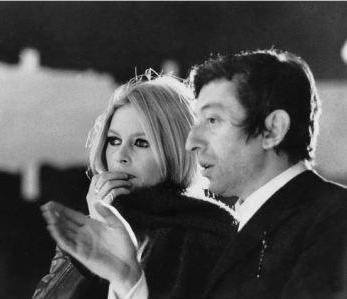Aidan Curran posted on September 25, 2009 19:00
Two of cinema's most famous female pin-ups were born only a week apart in September 1934, which means that each lady celebrates her 75th birthday around now.
 Sophia Loren hit the three-quarter-century last Sunday, 20 September. (We mentioned her recently on this blog because of 'Locomotion', the fantastic debut single from a Paris soul-pop band called The Sophia Lorenians.) And Brigitte Bardot (right) will clock up soixante-quinze on Monday 28 September.
Sophia Loren hit the three-quarter-century last Sunday, 20 September. (We mentioned her recently on this blog because of 'Locomotion', the fantastic debut single from a Paris soul-pop band called The Sophia Lorenians.) And Brigitte Bardot (right) will clock up soixante-quinze on Monday 28 September.
One feels that Loren's legacy is more substantial that Bardot's. The Italian is an Oscar winner who proved her acting credentials in those iconic 1960s on-screen partnerships with Marcello Mastroianni in 'Marriage Italian Style' and 'Yesterday, Today and Tomorrow'. By contrast, Bardot's fame lies in her 1950s image as a sensual provocateur and sex symbol, like in 'Et Dieu Créa La Femme' and 'Le Mépris', but hardly as a great actress. (In this regard she has a lot in common with Marilyn Monroe.) Today she lives in semi-reclusion, having ended her film career in 1973.
What's more, Bardot's activities of recent years have metaphorically isolated her as much as her reclusive lifestyle. She is an outspoken and combative defender of animal rights, often breaking her reclusion to condemn countries like Canada and China for the hunting and killing of endangered animals. Her iconic status ensures that such statements still make the headlines.
More controversially, on a number of occasions she has been convicted for incitement to racial hatred, based on statements in articles and books where she complained about the increasing Muslim population of France. (Her current husband, Bernard d'Ormal, is a former adviser to Jean Marie Le Pen's far-right Front National party.)
Ironically, Bardot's reputation may get a boost from her musical career. We say 'ironically' because, quite simply, she can't sing. But her monotonous vocals have featured on some of the most influential pop singles ever made - her mid-'60s songs with or by Serge Gainsbourg. These records have received new attention lately thanks to the current collaboration between Scarlett Johannson and Pete Yorn, which both parties say is inspired by the Gainsbourg-Bardot double act.
Gainsbourg started writing singles for Bardot when she was appearing in her own 1960s variety show on French television. Some of the songs - like 'Harley Davidson' and 'Contact' - feature Bardot alone, her attitude and sex appeal compensating for her modest singing ability. Other songs, like 'Comic Strip', saw the great man share vocal duties with her. If these singles were any more Swinging Sixties they'd be dressed as Austin Powers.
 But the high-water-mark of their partnership was the 1968 album 'Bonnie And Clyde'. Inspired by/cashing in on the hit movie of the previous year, Gainsbourg and Bardot (left) cast themselves as Warren Beatty and Faye Dunaway's glamorous outlaws. The best-known song is the title track, which also appeared on Gainsbourg's other 1968 album, 'Initials B.B.' (That album's title track is also justly celebrated, but Bardot doesn't appear on it even if it's named for her.)
But the high-water-mark of their partnership was the 1968 album 'Bonnie And Clyde'. Inspired by/cashing in on the hit movie of the previous year, Gainsbourg and Bardot (left) cast themselves as Warren Beatty and Faye Dunaway's glamorous outlaws. The best-known song is the title track, which also appeared on Gainsbourg's other 1968 album, 'Initials B.B.' (That album's title track is also justly celebrated, but Bardot doesn't appear on it even if it's named for her.)
Even if you have no knowledge of or interest in French music, the song 'Bonnie And Clyde' should be recognisable to you. With its cold-blooded glamour and distinctive instrument parts, it has been covered, sampled and imitated on records and advertisement soundtracks. The acoustic guitar chord sequence, swarm-of-bees string arrangements and wobble-board backing vocals make for a twitchy, unstable mix of tension and eccentricity. It sounds like nothing else in pop music.
Gainsbourg recites each verse couplet like a bard glorifying a legendary hero, then croons the pre-chorus and chorus with defiant fatalism. Bardot, in acting jargon, gets less lines than her co-star - she doesn't appear until the middle of the second verse and by the second chorus her only contribution has been to say her character's name twice. But her entrance ("Bow-nee", she drawls) is a scene-stealer and her monotone perfectly suits the song's tone and theme. She gets a key line, "On pretend que nous tuons de sang-froid" ("They claim we kill in cold blood"), and delivers it with the jaded indifference that the lyric implies.
Here's the Scopitone video, where the pair play the eponymous fugitive bank robbers. It's clear here that the better singer is also the better actor:
More ...
[Read More...]